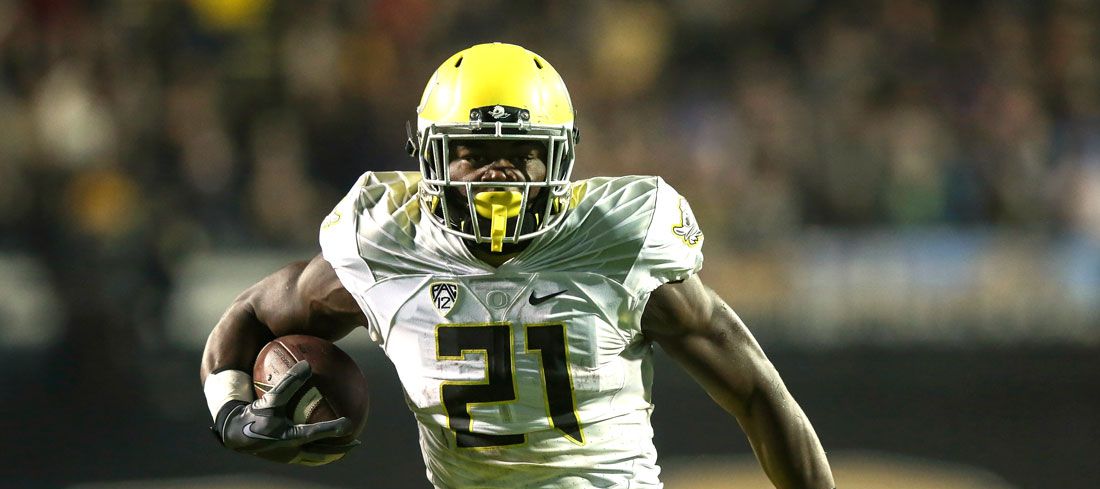Royce Freeman didn’t really get the chance to visit his hometown of Imperial, California this past summer. Instead, the 5’11, 230 pound Oregon running back was in town hitting the books.
“The classes that come with psychology are very interesting to me,” Freeman says. “They’re very challenging and definitely help me with my overall development. I could definitely see going into that profession. I’m always going to keep my options open.”
Of course, he spent some of his time this summer preparing for yet another football season. When a guy is currently ranked as the seventh best overall player in college football, he’d better be ready.
“That’s cool,” he humbly states about the ranking. “I’ve seen the other players on the list and they’re basically interchangeable. Everybody has to fight for the ability to be anywhere near the top. It’s an honor to be on that list, but I know I’ve got a lot of work to do still.”
It is this particular attitude that has garnered Freeman the respect of his coaches and his teammates.
“Royce is very much like (former UO and current NFL running back) Jonathan Stewart,” says UO running back coach Gary Campbell. “Same kind of powerful physique, about the same speed, and also has the same kind of temperament.”
“He helps the backs out as a group for sure,” says junior running back Kani Benoit. “It helps us compete when we watch him. Because you see him bust big runs, you want to do the exact same thing. I’d say we kind of fuel off his success. He also leads by his actions. He shows up early and is one of the first guys out on the practice field or wherever. Royce does it more with his verbs than his words.”

There’s no question Freeman’s performance over the past two seasons has improved.
“He’s learned to keep people off of his body,” Campbell explains. “He used to just run and be tackled, but now he’s learned to have some escape skills and not just be about pure strength. He’s a more aggressive kind of a runner. Our main focus this year is going to be about finishing long runs, particularly when he’s attacked at the end of a run. In the past, he’s had a tendency to slow down and cut away from defenders. But I want him to use his power and run through those guys at the end.”
Freeman concurs with that assessment.
“I definitely feel like I’ve improved,” he says. “Coach Campbell has been working with me in film and with my style of running. I’m more aware of using my hands, keeping defenders off me, and trying to finish runs. I’m always trying to work on finishing runs better. I never think I’m the best out there and there are always things that can be learned. I’m trying to be the best, and improving is only going to help me. All this talk about how great I am, I just kind of brush that off.”
What he won’t brush off is what happened a year ago. While the Ducks had a solid 9-4 record, the losses were frustrating for a program with great expectations every season. The most bitter of those came at the end when Oregon lost 47-41 to TCU in the Alamo Bowl after holding a 31-0 lead at halftime.
“It leaves a bitter taste in your mouth,” Freeman says. “You definitely try to flush it, but it’s going to appear every now and then on national television as one of the top 25 games. It’s rough.”
As a result, Oregon finds itself in the unusual spot of being picked third in the Pac-12 this season. By the same token, Freeman believes that it can be a motivator going forward.
“It’s something you’ve got to build on,” he explains. “It’s up to the veteran players like myself to have to make a point to the younger guys that we’re not going to let something like that happen again.”
And he also believes the pieces are in place to get the Ducks offense moving faster than ever in 2016.
“We have to push the pace a bit and work on our tempo,” Freeman says. “But we have a lot of talented, versatile guys and we just have to the make plays out there.”


